-
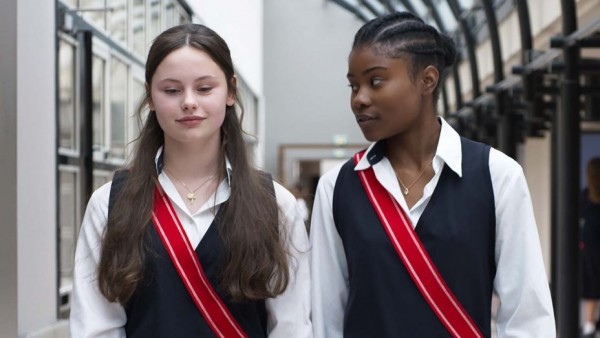
LOUISE LEBEQUE, WISIAND LOUIMAT IN ZOMBI CHILD
Zombi Child (Bertrand Bonello). Directors Fortnight.
(French film, English-language title.) The spelling follows the original Creole, which is the kind of zombies or zombis Bonello is focused on (one that slowly struggles to come back to life), along with a second story about girls in a state school, one of whom may be a zombie too. This is Bonello's first stab at a genre film,and his eighth feature, says Jordan Mintzer in Hollywood Reporter. Only the three last ones are well known, but they are very well known (and I am a fan): House of Tolerance aka L'Apollonide (Souvenirs de la maison close), Saint Laurent, and Nocturama). Zombi Child, says Mintzer, "feels like two incomplete movies in one, neither of them fully satisfying in the end, though there are "some graceful moments scattered throughout", particularly in the Haitian scenes. Not one of Bonello's greatest successes, perhaps, but a fresh take on the subject, apparently, marked by exquisite craft, and with great music, largely by Bonello himself as usual.
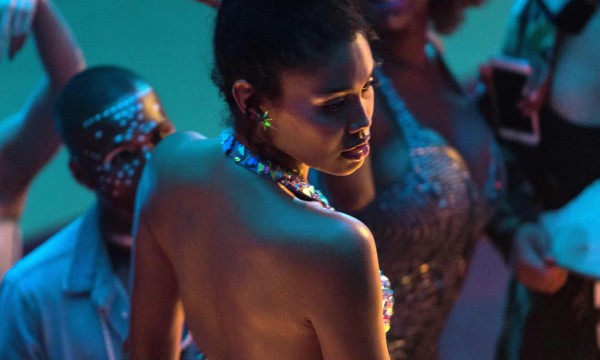
LEYNA BLOOM IN PORT AUTHORITY
Port Authority ( Danielle Lessovitz). Un Certain Regard.
From New York, first-time writer-director Lessovitz follows a young guy who barely escapes homelessness when he comes from Pittsburgh to the big city and his half-sister is not at the famous grim bus terminal to greet him, and he falls in with "New York’s Kiki ballroom scene – a carnivalesque LGBT club culture that evolved from voguing," and is troubled to be attracted to a young trans gender woman. "Port Authority is vehement, urgent and sensual – not perfect, and I would have liked to have seen more extended dance sequences. But it is made with storytelling gusto and heart" writes Peter Bradshaw, who gives in 4 our of 5 stars in his Guardian review.

LISE LEPAT PRUDHOMME IN ROUEN CATHEDRAL IN JOAN OF ARC
Joan of Arc/Jeanne d'Arc (Bruno Dumont). Un Certain Regard.
Dumont's biopic is "a stately, deadpan classical-absurdist pageant" of "a child warrior on the march," adapted from Charles Péguy’s writings about her, says Bradshaw, that's "passionless and exasperating." Lise Leplat Prudhomme, who played in Dumont's 2017 Jeannette: The Childhood of Joan of Arc, (RV-2018), back again, has "undoubted charisma," and there's a cameo by Fabrice Lucchini as Charles VII (he played Percival in Eric Rohmer's Percival le Valois in 1978, an early role), but the whole thing may be a "longeur," and is often "torpid." It may best be seen as a way-station toward something more evolved by the formerly compelling director, says Bradshaw, who gives it a dismal 2 out of 5 stars. Like its predecessor, the film is full of lip-synched rock numbers, is shot on the beaches of northeastern France (and in Rouen Cathedral), and makes no attempt at historical authenticity. For Dumont completists only, and 137 minutes long. I have a lot of time for this amazing and original filmmaker, but this latest bent has not repaid my patience as well as earlier work or amused as do his recent "Li'l Quinquin" films.

Too Old to Die Young (Nichlas Winding Refn). TV. Grand Theatre Lumiere.
Not sure what Cannes category this falls under (Out of Competition, clearly), but two episodes (4 and 5) of this new TV series (Refn calls it a 13-hour film) have just been shown at Cannes on the super-big screen of the Grand Theatre Lumière there, and it has been vividly reviewed. With caveats: that it's tedius and horrifying. It concerns Los Angeles cop, played by the energetic Miles Teller, who moonlights as a contract killer and "who comes under the sway" of former military colleague John Hawkes' "apocalyptic visionary," writes David Rooney in his Hollywood Reporter review, who says it shows the Danish director's "steady slide deeper and deeper into empty genre posturing" has gone as far as it can go. Bradshaw is more taken with it, calling it a "doomy, sepulchral, and very plausible evocation of pure evil" and a "dead-eyed LA nightmare," and giving it 4 out of 5 stars. Gregory Ellwood, on Collider, thinks it's ambitious and "at times brilliant" but "not as deep as it thinks it is." Sounds to me as if cop series binge-watchers will want to take a look, but some may not have the patience for its long silences.
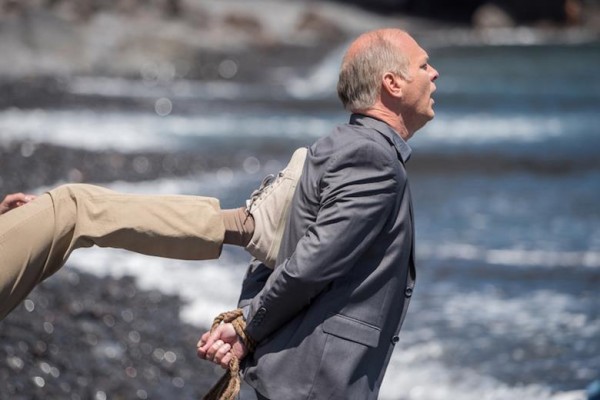
The Whistlers/La Gomera (Corneliu Porumboiu 2019). Competition.
This time the noted Romanian director Corneliu Porumboiu (Police, Adjective, When Evening Falls on Bucharest or Metabolism , The Treasure) takes a turn into genre territory with a neo-noirthriller set in the Canary Islands and Singapore. Leslie Felperin describes it in Hollywood Reporter as an "entertaining but dense" depiction of a cop who doubler-crosses both his department and gangsters he's cooperating with. It "constantly corkscrews around in every sense, deploying flashbacks frequently as it reveals twist after twist" while the protagonist, Lee Marshall writes in Screen Daily, is deliberately cast as a "passive cipher" or "poker-faced Everyman." The shared note from Polombiu's earlier arthouse works, says Felperin, is a preoccupation with language, power, and the legacy of the corrupt and repressive Nicolae Ceaușescu regime. The result, though, "feels a little woolly and unfocused," says Marshall. Peter Bradshaw in is Guardian review, however, likes The Whistlers very much, calls it "thrilling," "knotty, twisty, nifty," and "An elegant and stylishly crafted piece of entertainment," and gives it 4 out of 5 stars.
Tomorrow:
The Lighthouse (Robert Eggers, of The Witch). Directors Fortnight.
Last edited by Chris Knipp; 05-26-2019 at 10:15 PM.
-
Eggers' new film
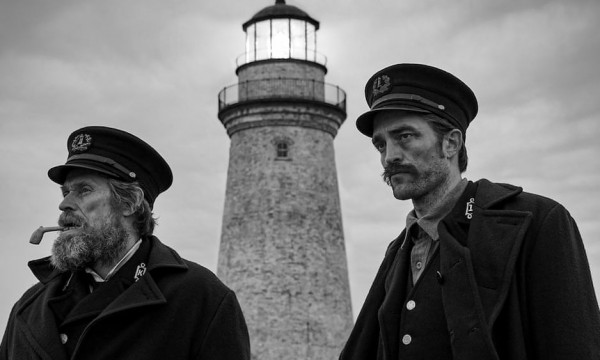
WILLEM DAFOE, ROBERT PATTINSON IN THE LIGHTHOUSE
THE LIGHTHOUSE (Robert Eggers). Directors Fortnight.
Peter Bradshaw's Guardian review gives it 5 out of 5 stars and suggests the new movie by Robert Eggers (whose The Witch was so much admired) is likewise a rousing success. It is a tense portrait in striking black and white of two men in 1890's Maine in physical and psychological torment as they man a lighthouse together and come apart under pressure of shared solitude and conflicting roles, with mood swings and tormenting mermaid visions. Eggers lets the tale hover between intense realism and horror, never making genre an issue, says Bradshaw, and Both Willem Dafoe as the man in charge and Robert Pattinson as number two chafing under his lowly role are fine, Pattinson especially, who "just gets better and better." Bradshaw also praises the rich poeticism of the period dialogue and the actors' delivery (the "script is barnacled with resemblances to Coleridge, Shakespeare, Melville"). Variety's Owen Gleiberman calls it "a gripping and turbulent drama," praising its "powerfully antiquated sense of myth and legend," the "weird immersive clarity" of its "shimmeringly austere black-and-white" and striking near-square aspect ratio, a movie "made with extraordinary skill" that you "can't pigeonhole." David Rooney's Hollywood Reporter review hails the "gripping performances thick with flavorful period dialect and jolts of ever-intensifying insanity soaked in rum." Nobody really has reservations, except whether this will be as great a commercial success as The Witch. (A24 produced again, and most of the Witch crew is back.)
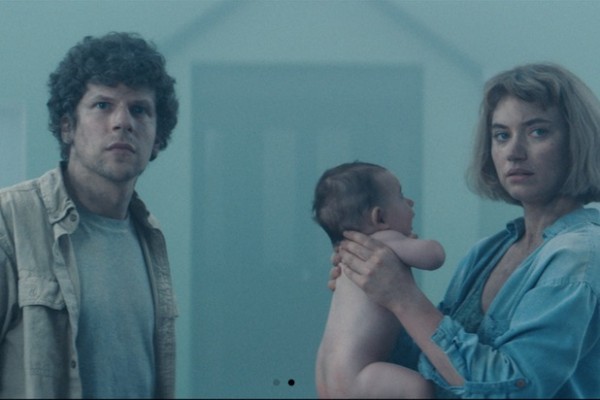
JESSE EISENBERG, IMOGEN POOTS IN VIVARIUM
VIVARIUM (Lorcan Finnegan). Critics Week, Feature Competition.
The premise of this second feature for Irish director Lorcan Finnegan is a couple goes to a plasticky suburb, in jest visit a model home, and are trapped and forced to live in it and raise a freakishly precocious baby supplied to them by malevolent outside Big Brother forces. It feels a lot like an extended episode of the Netflix sci-fi series Black Mirror, says Stephen Dalton (Hollywood Reporter), with echoes of "cult dystopian authors" like JG Ballard and John Wyndham and with "eye-pleasing nods to the surrealist art of Rene Magritte and MC Escher." Poots shines and has more emotional depth while Eisenberg seems underused and miscast as a rugged outdoor type tasked with lots of physical work. A "smart and gripping yarn," says Dalton. But Ben Croll of The Wrap thought it tries to say too much about too many topics and "never fully satisfies on any one front." He thinks it could have been good as a "comic allegory" à la Jorge Luis Borges or a more overtly sci-fi piece that would "lean harder into the human menagerie connotations of the title," but unfortunately, it is neither one nor the other, and winds up unfocused, a shame because it "engages from a technical perspective."
Last edited by Chris Knipp; 05-26-2019 at 10:18 PM.
-
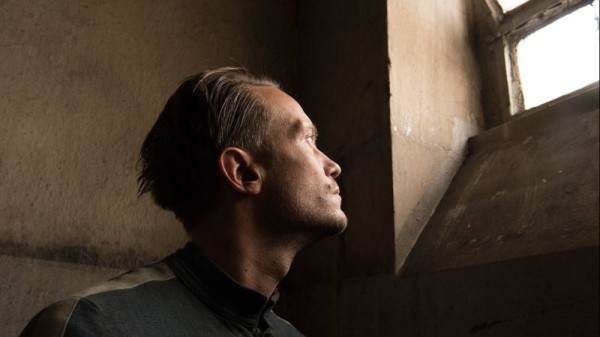
August Diehl in A Hidden Life
A Hidden Life (Terrence Malick). Competition.
David Erlich of IndieWire says this is his best movie since Tree of Life but the material is different: the true story of Austrian farmer turned conscientious objector Franz Jägerstätter, who refused to take the Hitler oath as a Wehrmacht conscript and in 1943 was duly executed. No battlefields, the war simply between a Christian and his conscience. Bradshaw says in the Guardian that it's "a high-minded hymn to modern saint that never quite comes to life" and gives it 3 our of 5 stars. This still has the Malilckian swirling camera and meditative mood, as Bradshaw describes it, with "An overpowering sense of being ecstatically, epiphanically in the present moment," with the "camera shots swooning, swooping and looming around the characters who appear often to be lost in thought, to an orchestral or organ accompaniment, and a murmured voiceover narration of the characters’ intimate but distinctly abstract feelings and memories." The problem is that the swoony approach has, Bradshaw says, "marooned and islanded Jägerstetter," cutting him off from the all-important historical moment and resultingly making his anguish as generic as that of Bale in Knight of Cups or Afflick in To the Wonder, though the stakes are so much higher here, and the details should be so much more distinctive. Peter Debruge oin Variety acknowledges this film works best for the Malick fan, but affirms that it's his best since Tree of Life and "feels stunningly relevant" about religionists selling out for political advantage.

Diego Maradona in the film by Asif Kapadia
Diego Maradona (Asif Kapadia). Out of Competition.
By the maker of the Amy Winehouse doc, this is, by many reports, a stunningly effective film about the poor boy from Buenos Aires who became the successor to Pele as the god of soccer, and his eventual fall from grace. HIs '86 World Cup "Hand of God" winning goal, photos show, was hand-assisted, which a commentator calls "a little bit of cheating and a lot of genius," and that goes for his career, says Eric Kohn in IndieWire (he gives it an A-). The path to downfall is multiple, including an extra-marital affair and child, involvement with a crime family, and a drug bust. Sometimes details come too fast even in over two hours, says Kohn, but Kapadia still keeps it hypnotically watchable. The account is "gripping," says Bradshaw in his enthusiastic Guardian review (he gives it 4 out of 5 stars) even though hampered by a lack of the kind of new material he had for his Winehouse film. Owen Gleiberman of Variety goes farther, says it all doesn't make sense to him, and Kapadia tries to reach for the stars, but doesn't have the revealing material to do "what he did for the fallen idols of 'Amy' and 'Senna'." A different fan base for an audience, though.
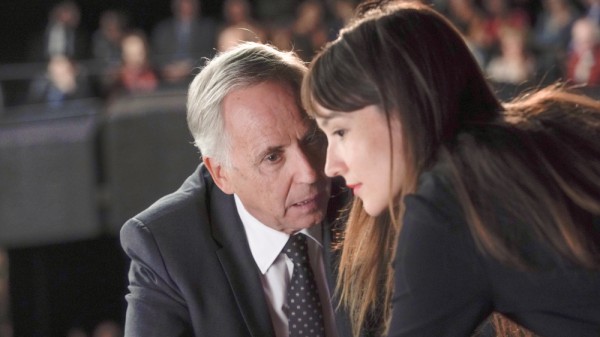
Fabrice Luchini, Anaïs Demoustier in Alice and the Mayor
Alice and the Mayor (Nicolas Pariser). Directors Fortnight.
Alice et le maire (the French title) is the sophomore effort of the French director who debuted with the subtle, understated political thriller The Great Game/Le grand jeu (R-V 2016) in which key players follow Nietsche's advice, "Whatever is profound loves masks." That seems to be a favorite saying of Fabrice Lucchini, the mayor of this new film, mayor of the city of Lyon, who after 30 years of politics is totally out of ideas. Sparks fly and preconceptions are shaken when he's provided with Alice Heinemann (Anaïs Demoustier), a brilliant philosophy scholar, to inspire him. Jay Weissberg of Variety thinks the result is far too talky, and Boyd van Hoeij of Hollywood reporter thinks Pariser can't decide if he wants to focus on ideas or people. He grants that Pariser, who studied with Eric Rohmer, handles the talk well. He thinks the rapport between the middle-aged mayor and the young teacher is fascinating, but has nowhere to go and ultimately stagnates. We'll have to see what French critics, who may appreciate the talk more, think of this movie when it hits French cinemas in October.
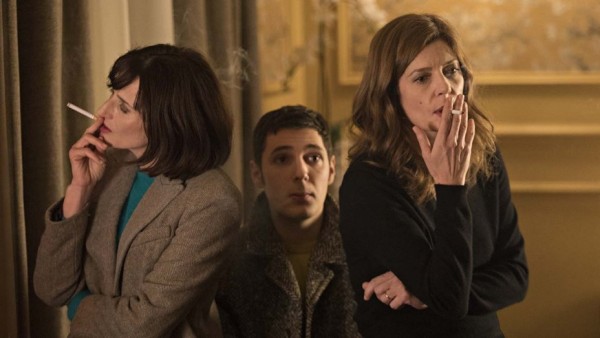
Camille Cottin, Vincent Lacoste, Chiara Mastroianni in Chambre 212
On a Magical Night/Chambre 212 (Christophe Honoré). Un Certain Regard.
Stephen Dalton says in Hollywood Reporter that this came just at the right time midway in the Cannes Festival when attendees much needed a "frothy" "bed-hopping" French farce as a "palate-cleanser." "Christophe Honore’s bittersweet comic fantasy stars Chiara Mastroianni as a highly sexed college lecturer weighing up the steep cost of loving," Dalton writes. Suppose, the film fantasizes, you could go back a few decades to your spouse in his youthful prime, would you still like him, knowing how jaded you'll get later on? A great "springboard into screwball comedy and counterfactual fantasy," says Dalton, even if Honoré gets his plot-line a bit muddled. Vincent Lacoste plays the young version of haughty oversexed prof Chiara Mastroianni's mature hubby played by Benjamin Biolay. This is a top cast. Honoré doesn't quite know how to end, says Dalton, but the final sequence, where Chiara and all her former lovers, including both the young and old version of her husband, meet at a bar and dance away the night to Barry Manilow, is a "patently dumb notion" that nonetheless delivers "a perverse kind of pleasure." It all may be too French for outside audiences, but the setup is readymade for a Hollywood remake.
Last edited by Chris Knipp; 03-07-2020 at 10:29 AM.
-
Today, 20 May 2019 at the Cannes Film Festival.
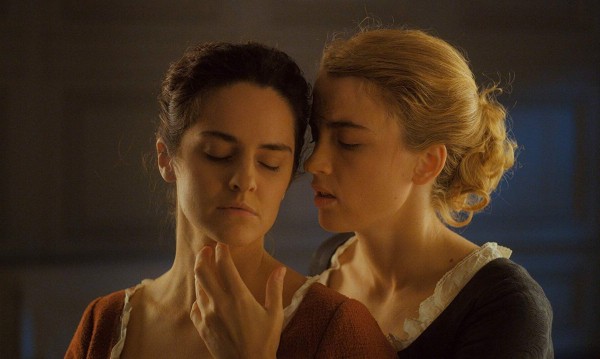
NOÉMIE MERLANT, ADÈLE HAENEL IN PORTRAIT OF A LADY ON FIRE
Portrait of a Lady on Fire (Céline Sciamma).
Céline Sciamma has built a distinguished reputation in the past 12 years for fresh and original femme-centric films, sometimes with a trans or gay bent. Portrait de la jeune fille en feu (the French title) is set in 1770 and concerns a painter, Marianne (Noémie Merlant), who must paint the marriage portrait of Héloïse (Adèle Haenel, of Sciamma's debut Water Lilies), the young daughter of a countess who has just left a convent. Peter Debruge in Variety calls this "a gorgeous, slow-burn lesbian romance." Héloïse is uncooperative. Her mother, the countess, orders Marianne to observe her during the day and work on her portrait at night, so she must devour her with her large eyes. The mutual fascination that develops eventually turns physical. The result is a subtle, nuanced depiction of the female gaze that only a woman could paint, Debruge says. Peter Bradshaw heralds the film in his Guardian review as "superbly elegant, enigmatic drama," that reveals the director's "new mastery of classical style." He gives it his top rating, 5 out of 5 stars.
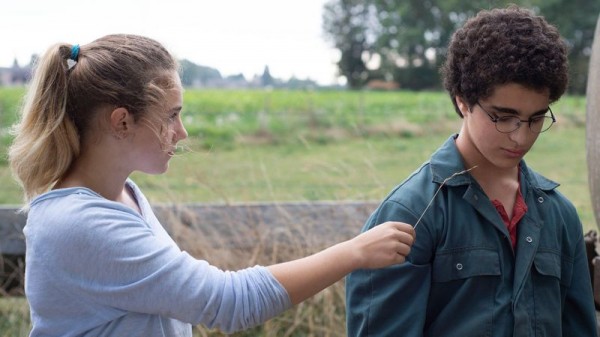
VICTORIA BLUCK AND IDIR BEN ADDI IN YOUNG AHMED
Young Ahmed (Luc and Jean-Pierre Dardenne). Competition.
Le jeune Ahmed (the French title) is about a Belgian teenager (the actor, Idir Ben Addi, was 13) of paternal Moroccan Arab descent but with a white non-muslim mother (whose husband is no longer around) who hatches a plot to kill his teacher after being taught a radical interpretation of the Quran. Leslie Felperin of Hollywood Reporter thinks Addi a "blank" actor like those of the Dardennes' earlier films that won them two Golden Palms, but neither she nor the Variety critic thinks this quite up to their strongest work, though better than their blandest: Eric Kohn of IndieWire places it midway on the spectrum. Bradshaw thinks this (like Sciamma's new film) "subtle". He gives it 3 out of 5 stars. Ahmed goes from video games to jihad in the space of a month and begins lecturing his mother and sister on their behavior. Ahmed attacks his teacher for too liberal an approach to teaching the Quran, and is put in youth custody. He may rethink, or more likely not. A work release meeting on a farm with an attractive girl who likes him could make a difference. Bu how he will develop is uncertain. The movie is marred, says Bradshaw, by a silly chase sequence used to jazz things up for an artificial conclusion. Peter Debruge of Variety suggests that as a sympathetic (if ambiguous) portrait of a budding Islamic terrorist, this may be the Dardennes’ "most controversial film yet." It sounds at least like one of their most puzzling.
Last edited by Chris Knipp; 05-26-2019 at 10:23 PM.
-
Also May 20.
Two portraits of two women
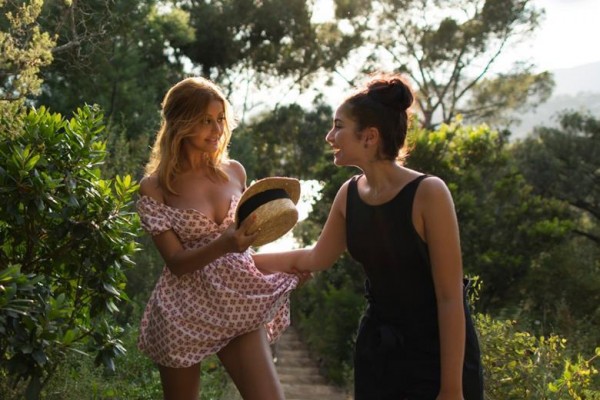
An Easy Girl (Rebecca Zlotkowsk). Directors Fortnight.
Une fille facile (the French title), is a watchable film, "Rohmer for the instagram age," says Screen Daily of this fourth film by the director who effectively pared Tahar Rahim and Léa Seydoux for her film Grand Central. This time it is two sisters, who pair off for the summer in Cannes, when the younger one (Mina Farid) is drawn into the luxurious ways of her older sister (actress, model and lingerie designer Dehar), with Benoît Magimel also in the cast.
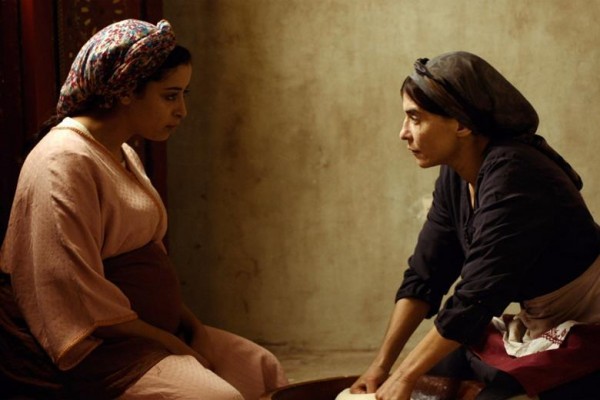
ERRADI AND AZABAL IN ADAM
Adam (Maryam Touzani). Un Certain Regard.
Moroccan filmmaker Maryam Touzani's debut feature turns "a simple story" into "gold" with its warm depiction of a homeless unwed pregnant woman and the widowed small bakery owner who befriends her, says Deborah Young in her Hollywood Reporter review. Set in Casablanca’s Old Medina, it's a tale that allows the actors time to make delicate transitions, and a main one is the bakery owner's gradual softening toward the pregnant woman.
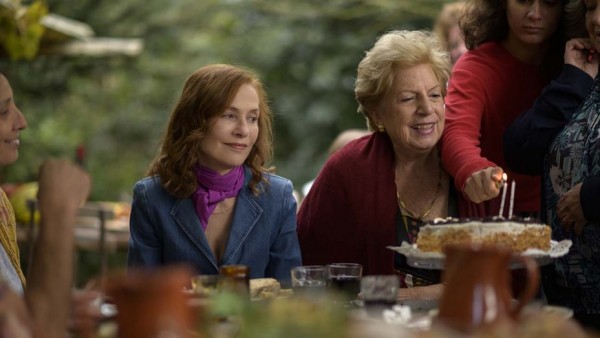
ISABELLE HUPPERT IN FRANKIE
Frankie (Ira Sachs). Competition.
Peter Bradshaw makes it immediately clear that he hated this film with a Guardian critique headed "Frankie review – Ira Sachs' bickering poshos bore us to tears," and he gave it an almost unprecedented 1 out of 5 stars.David Rooney of Hollywood Reporter says it "offers many gentle pleasures," a main one being the mountainous Portuguese scenery for which Sachs has left left behind his New York settings (it's like a bland Woody Allen location film, Bradshaw comments, but without the humor). And yet the longtime indie director has assembled an A-List cast here. Huppert is supported by the likes of Greg Kinnear, Brendan Gleeson, Jérémie Renier and Marisa Tomei. Bradshaw acknowledges Sachs' recent Little Men (2016) and Love Is Strange (2014) have been superb, so he can't fathom how he could have laid an egg "so big that the walls of the Palais des Festivals may have be knocked down so it can be safely removed." The premise: Francoise (Frankie, Huppert), a film and TV star, has brought her family to the Portuguese town of Sintra for a luxurious holiday to tell them something, but this is complicated when one of them takes the opportunity to propose marriage to another member of the party. Rooney acknowledges that this is a "sedate" and "gossamer-thin" effort lacking the "emotional complexity" and "intense personal investment" of Sachs' best work. But he supposes that its "classy old-school art house veneer" will make it sell as a fall Sony Picture Classics release.

HAFSIA HERZI IN YOU DESERVE A LOVER]
You Deserve a Lover (Hafsia Herzi). Critics Week.
Tu mérites un amour (the French title) features Hafsia Herzi in front of and behind the camera in (says Screen Daily) "a brisk, energetic low-budget tale of a Parisienne’s romantic trials and tribulations." "A brisk femme-positive approach and the personal urgency that comes with Hafsia Herzi’s energetic, no-bullshit presence", and it's her directorial debut. She became known playing the lead in Abdellatif Kechiche's Secret of the Grain. The story's all about Lila (the protagonist played by director Hirzi) coming to accept that her boyfriend who dumped her wasn't worth it anyway. "Some of the dialogue is wickedly pungent," says Deborah Young in her Hollywood Reporter review. Naturalness, warmth, humor, a relaxed pace as well as a very modern frankness about sex (and the director-star's beauty and personal charm) make this otherwise conventional Parisian screen entertainment stand out from the crowd.
Last edited by Chris Knipp; 05-26-2019 at 10:25 PM.
-
Cannes May 21, 2019
MOST ANTICIPATED EVENT today is the showing of Quentin Tarantino's new movie, Once Upon a Time... in Hollywood, about some down-on-their luck actors at the time of the Sharon Tate murders, with Bruce Lee and Charles Manson as incidental characters and starring Leonardo DiCaprio and Brad Pitt. Tarantino has posted an open letter to all Cannes writers and attendees about spoilers - asking all not to give away stuff. See the letter H E R E.
Bradshaw calls Gaspar Noë's Lux Æterna "self-parodic silliness" and gives it 2 out of 5 stars.
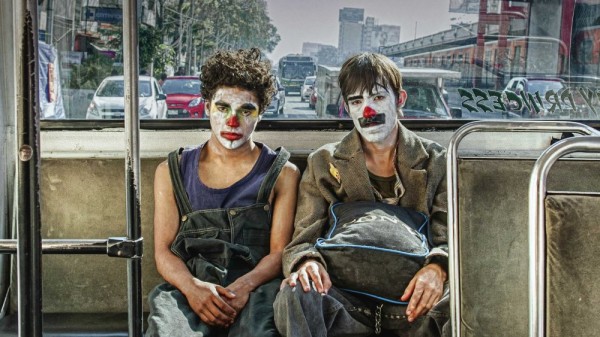
BENNY EMMANUEL, GABRIEL CARBAJAL IN CHICUAROTES
Chicuarotes (Gael García Bernal). Special Screenings.
This is the second directorial outing from Gael García Bernal, a long time since the first (2007), and a disappointment, says Screen Daily's Jonathan Romney. That debut was Deficit , a "coolly ironic depiction of Mexico’s spoiled middle-class youth," This one, explains Romney, returns "more or less" to Amores Perros territory (the film that brought him international recognition as an actor), depicting "two young working-class chancers desperate to improve their lot" who wind up "screwing up in every way." It's like a "WhatsApp-era Los Olvidados, with "energy to spare" but a "tonal discontinuity" that "scuppers the film," oscillating between "goofy comedy, hard-nosed violence and wildly overplayed melodrama."
Last edited by Chris Knipp; 05-26-2019 at 10:27 PM.
-
Screen Daily's jury grid.
Yesterday's showed Almodóvar's Pain and Glory in the lead of critics' ratings (3.3), then Portrait of a Lady on Fire (3.1), Atlantics (2.8), Wild Goose Lake (2.7), Bacaru (2.6), and Les Misérables (2.4). Malick, Polombiu and Loach all got the same in-between score (2.5). Jim Jarmusch's opener The Dead Don't Die scored lowest (2.2).
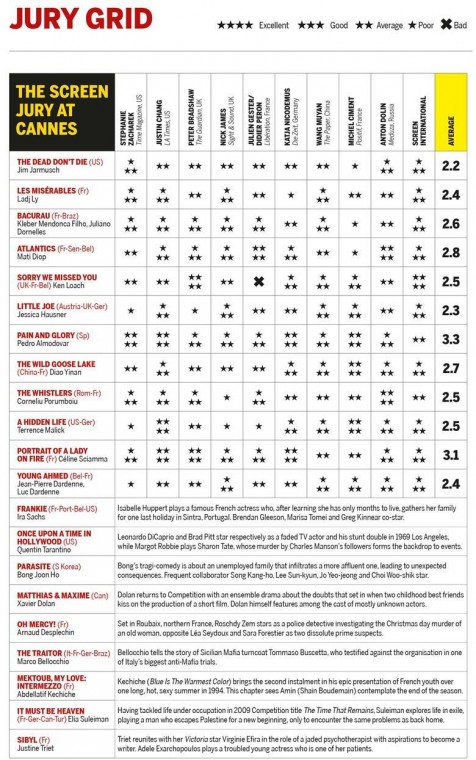
Last edited by Chris Knipp; 05-21-2019 at 01:17 PM.
 Posting Permissions
Posting Permissions
- You may not post new threads
- You may not post replies
- You may not post attachments
- You may not edit your posts
-
Forum Rules









 Reply With Quote
Reply With Quote














Bookmarks